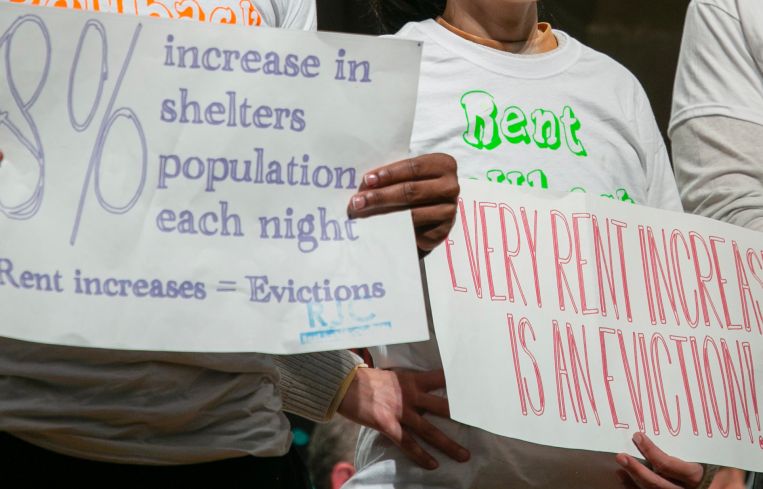NYC Rent Guidelines Board Hikes Rents 2.75% for 1 Million Apartments
By Abigail Nehring June 17, 2024 8:19 pm
reprints
Tenants in New York City’s nearly 1 million rent-stabilized apartments will see their rent go up again this year, this time 2.75 percent for one-year leases and 5.25 percent for two-year leases.
The Rent Guidelines Board approved the rent hike Monday night in a 5-to-4 vote. The raucous public meeting got off to a late start after protestors blocked the entrance to the Hunter College assembly hall where it took place and police arrested at least 11 people, according to a tenant activist on the scene.
The New York City Police Department confirmed multiple people were arrested for disorderly conduct, but could not immediately provide an exact figure.
The boos and shouts of dissent during the meeting made it difficult to hear at times, and the protests have reached a new pitch in the last few years, leading the two owner members of the board to request the meeting take place virtually, The Real Deal reported. The board chair ultimately did not acquiesce to their request.
Tenants called on the board to freeze rents this year, citing the city’s historically low rental vacancy rate of 1.4 percent, while landlord members — who emphasized rising costs to operate rent-stabilized multifamily buildings — wanted an even higher increase of 4.5 percent for one-year leases.
This year’s increases for one-year leases were lower than the 3 percent hikes last year and the 3.25 percent in 2022 — the highest the board has approved in about a decade — but sets the tone for what’s to come under the remainder of Mayor Eric Adams’s time in office.
“What a difference an election makes,” New York City Public Advocate Jumaane Williams told the protestors minutes before the vote took place Monday, according to a video posted on X. “During the last administration, we saw some of the lowest increases we’ve ever seen. Unfortunately, the Adams administration has gone in the other direction.”
Even Adams urged restraint Monday afternoon, telling reporters he hoped the board would vote for a low increase this year.
“The rent is too damn high,” Adams said, echoing one-time gubernatorial candidate Jimmy McMillan. “People are hurting. Affordability is crucial in the city.”
But those words ring hollow to Sheila Garcia, a former tenant member of the board who served multiple terms under former Mayor Bill de Blasio. The board voted to freeze rents multiple times during the de Blasio administration during a rosy period when landlords’ incomes increased steadily.
But Adams replaced Garcia just as the COVID-19 pandemic was beginning to wane and landlords complained of rising costs to maintain their properties, leading to historic increases despite tenants struggling.
“Folks in the Bronx had really high death rates during the pandemic and were severely rent-burdened, but the board still made a uniform position to increase rents for all tenants during a pandemic,” Garcia said. “That got the ball rolling on all of the other shifts we have now on this board.”
Garcia was troubled by how inattentive board members were — some even appeared to fall asleep — during several weeks of public hearings in the lead-up to Monday’s vote.
“That’s a real shift from wanting to listen and engage community members in the last decade,” Garcia said.
The Legal Aid Society’s Adriene Holder echoed that sentiment in a statement after the vote.
“The board seems interested only in continuing to line the pockets of landlords while tenants are left to suffer the consequences,” Holder said. “We condemn tonight’s vote in the strongest possible terms.”
Rent-stabilized landlord group the Community Housing Improvement Program agreed that the board needed to be overhauled but for different reasons. Executive Director Jay Martin argued in a statement that the process to decide on increases “is driven by relentless political pressure instead of an honest assessment of the data available to board.
“We need to stop this chaotic carnival and work on real solutions that ensure renters have quality housing they can afford to live in,” Martin said. “Defunding buildings doesn’t do that. Runaway costs don’t do that. Ignoring data doesn’t do that. Investing in housing and tenants does.”
The mayor avoided taking either side in a statement after the vote, saying “the only way to ultimately lower rents is to build more housing, and we are using every tool in our toolkit to build that housing more quickly.”
Abigail Nehring can be reached at anehring@commercialobserver.com.



